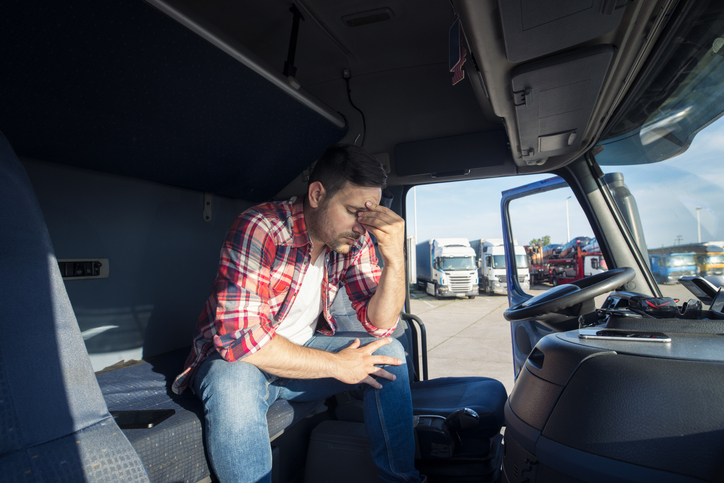With many positive COVID-19 cases still emerging and displayed on the news, information and uncertainty can cause stress and anxiety for many individuals. With the fear of the disease spreading, it can cause different emotions in not only children but adults as well. With everyone reacting to stress and anxiety differently, it can be hard to help those around you feel more at ease. Also, how someone responds to anxiety and stress can depend on their background, who they surround themselves with, and the community in which they live.

For truck drivers and other carriers, it can be challenging to find proper outlets and resources to help cope with stress and anxiety during this time. Mostly because we are still out on the road as essentials.
Mona Shattell, Associate Dean at Johns Hopkins University, School of Nursing, “Men don’t seek care, especially mental health care, as readily as women. This is amplified by an industry that’s primarily men and hyper-masculine industry at that. You have DOT regulations that make it difficult, if not impossible, for medications that could really help.”
While it can be difficult for those in the trucking industry to seek help with mental health, there are other ways to help cope with anxiety and stress.
How to Cope with the stress of COVID-19?
There are many different things that truck drivers can practice while out on the road to help eliminate the stresses of COVID-19; these can include:
- Taking multiple breaks from listening to the news – Let’s face it, there is not much to do while driving but listen to the radio. When you continually wrap your time up in listening to the news, this can send your body into panic mode. Take time to listen to other news throughout the world and less about COVID-19. Limit yourself on how much you not only listen but also choose your news sources wisely. Add in an audiobook or podcast instead, or better yet jam out to those favorite tunes!
- Care for your body – by taking care of your body, you can help reduce stress and anxiety. Take a few minutes out of your day to practice deep breathing, stretching, and even meditating. At your next rest area get out and stretch and get fresh air. Sit quietly on a park bench or table and just breathe. While in your truck practice deep breathing techniques and neck stretches.
- Eat a well-balanced diet – eating healthy and getting plenty of physical exercises can help your body not only stay in the best shape, but it can also help get your mind off the stressor around you. Incorporate physical activity 20-30 minutes every day.
- Participate in healthy activities – since we are all practicing social distancing, now is the time to participate in a hobby you once enjoyed that you felt like you never had time for. During any downtime, pull out a word search or a crossword, play a few video games to keep your mind busy.
- Stay in contact – keeping in touch with friends and family via phone, email, letters, text messages, video chat, and social media. This will help you feel more connected and less social distanced.
- Set realistic goals and stick to them – This is a good practice for all of us regardless of our career or the effects of COVID-19. We all need a realistic goal. Start with a small goal and give yourself a time limit to hold yourself accountable. Make a list of how you can achieve the goal and put those plans in motion. Keep a journal to record your progress. Remember it takes 30 days to start a habit.
- Focus on facts – only share facts about COVID-19 and understand your actual risk. Much of news not only on news sites but also word of mouth is not factual.
Resources for Mental Health
Dealing with mental health and anxiety is already difficult. Then add in a health pandemic and being out on the road away from friends and family. If you are struggling with mental health issues, know that it is okay to reach out and talk to someone. There are many resources available for individuals, including truck drivers. You are not alone. Always in an emergency call 911. However, if it is not an emergency below are a few resources you can reach out to:
- Substance Abuse and Mental Health Services Administration (SAMHSA) Helpline:
Call: 1-800-985-5990 (TTY 1-800-846-8517)
Text “TalkWithUs” to 66746 - National Institue of Mental Health (NIMH) visit – nimh.nih.gov/findhelp



 The most asked question a Landstar recruiter receives is, “how much money can I make when leasing with Landstar?”
...
The most asked question a Landstar recruiter receives is, “how much money can I make when leasing with Landstar?”
...

